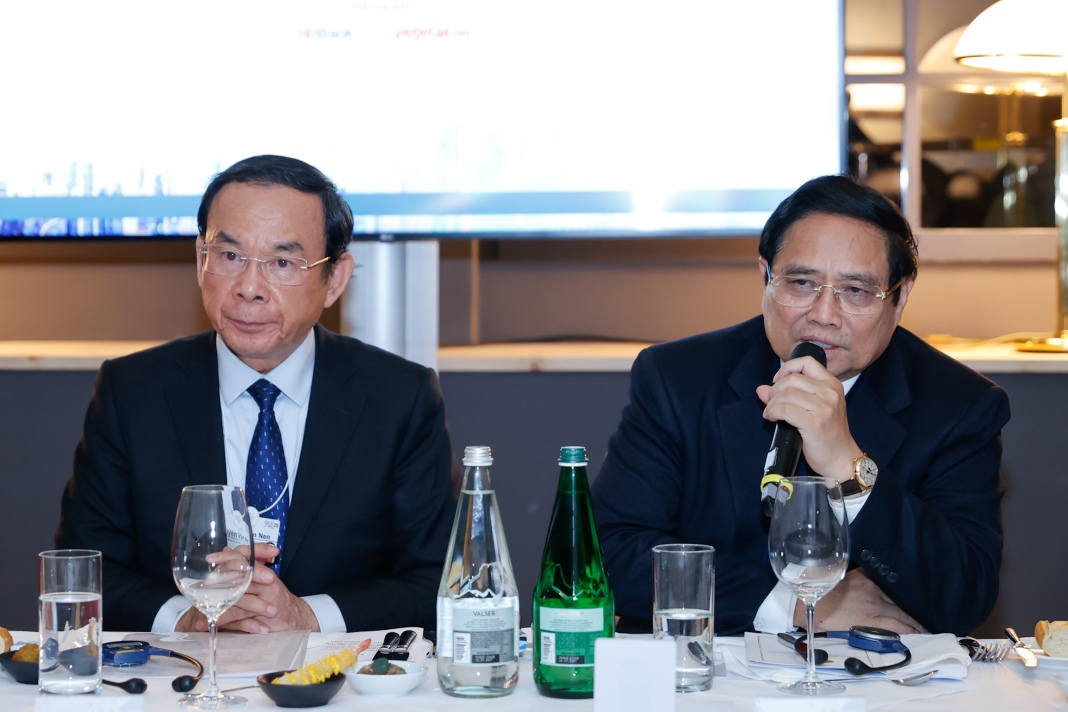HCMC – Vietnam is aiming to establish an international financial center in HCMC within the next five to ten years, Prime Minister Pham Minh Chinh said on January 21 during a roundtable on developing the Center for the Fourth Industrial Revolution (C4IR) and an international financial center in HCMC on the sidelines of the World Economic Forum (WEF) in Davos, Switzerland.
The event, titled “AI in Smart Manufacturing and the Development of HCMC’s International Financial Center,” gathered government officials, industry leaders, and international delegates to discuss strategies for advancing HCMC’s financial market and integrating artificial intelligence (AI) into economic growth.
PM Chinh underscored the importance of measurable outcomes and emphasized the role of the C4IR as a cornerstone of innovation and a symbol of collaboration with the WEF. Major corporations should share their expertise in building HCMC into an international financial center within a decade, ideally within five years, he said.
He also advocated for a pragmatic, step-by-step approach to implementation, emphasizing adaptability and encouraging stakeholders to provide feedback and suggestions to enhance HCMC’s role as a technological and economic powerhouse.
The event also saw the attendance of Nguyen Van Nen, secretary of HCMC’s Party Committee, and representatives from Sovico Group, the WEF, and global corporations.
Vietnam has made significant strides since launching its national AI strategy three years ago, with notable enhancements in productivity and economic efficiency across multiple sectors. Delegates highlighted the country’s potential to build a modern financial system by leveraging AI and innovation.
HCMC is prioritizing green and sustainable growth, focusing on key areas such as semiconductors, AI, and digital infrastructure, Nen emphasized. The city’s C4IR, established in 2024 with WEF’s support, is at the core of these efforts.
Establishing an international financial center in HCMC is not only a goal for the city but also a priority for the Party and the Government, Nen reiterated.
Corporate leaders expressed strong support for Vietnam’s growth ambitions. Sovico Group, with its achievements in aviation, banking, and real estate, announced plans to invest in strategic sectors such as technology, digital infrastructure, and renewable energy. The group aims to create one of Southeast Asia’s largest data centers powered by clean energy, construct a submarine cable connecting Vietnam and Singapore, and equip Vietjet’s fleet with satellite internet.
“We believe that with the Government’s support and direction, Vietnam can emerge as a new high-tech hub in the region,” said Nguyen Thanh Hung, founding chairman of Sovico Group. The group pledged to support national initiatives in AI and semiconductors, aligning with Vietnam’s sustainable and modern development goals.
Intel, which has exported goods worth US$29 billion from Vietnam—representing 60% of the company’s export value—committed to furthering the country’s economic growth. “Intel has received strong support from Vietnam, and we remain committed to contributing to its strategic goals and green initiatives,” said Naga Chandrasekaran, executive vice president of Intel. The company plans to bring more global suppliers to Vietnam, support its 8% growth target for 2025, and foster double-digit growth in subsequent years, all while aiding HCMC’s financial center development and net-zero emissions goals.
“Intel has received strong support from Vietnam, and we remain committed to contributing to its strategic goals and green initiatives,” Chandrasekaran said.









